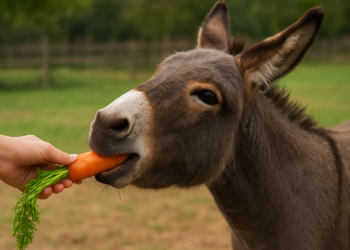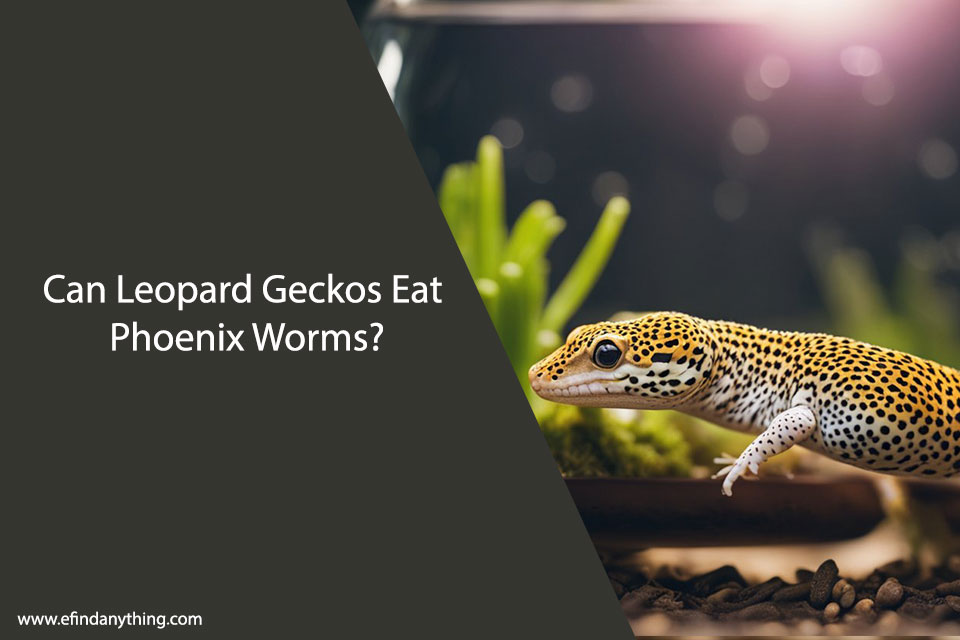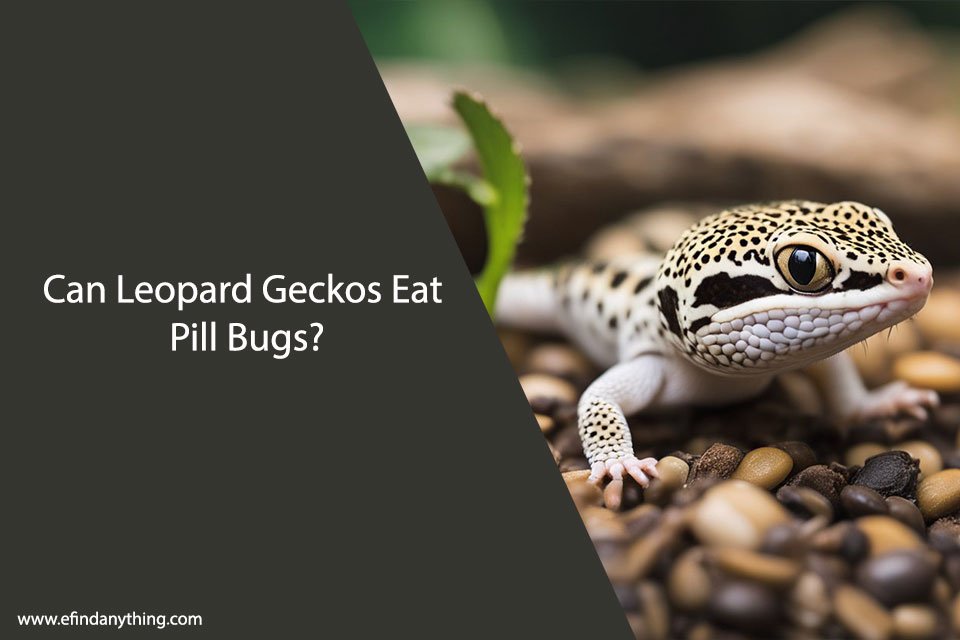Leopard geckos are popular pets among reptile enthusiasts due to their docile nature, unique appearance, and low maintenance requirements. As with any pet, it’s important to provide them with a balanced and nutritious diet to ensure their health and well-being. One question that frequently arises among leopard gecko owners is whether or not they can eat pellets as part of their diet.

Pellets are a common food option for many types of pets, including dogs, cats, and fish. They offer a convenient and easy way to provide a balanced diet without the need for preparing fresh food every day. However, when it comes to leopard geckos, the answer is not so straightforward. While some leopard gecko owners swear by feeding their pets pellets, others caution against it, citing potential health risks. So, can leopard geckos eat pellets? Let’s explore this topic further.
Can Leopard Geckos Eat Pellets

Leopard geckos are insectivores that require a diet high in protein and low in fat. While many leopard gecko owners feed their pets live insects such as crickets, mealworms, and dubia roaches, some may wonder if pellets can provide a balanced and convenient diet for their pets.
Pellets are commercially available food products that contain a mixture of grains, vegetables, and meat. While some brands may claim to be suitable for leopard geckos, it is important to note that these products are not a natural part of their diet and may not provide all the necessary nutrients.
Leopard geckos may consume pellets if offered, but it is not recommended as a staple diet. Pellets may lack essential nutrients such as calcium and vitamin D3, which are crucial for the growth and development of leopard geckos. Additionally, the hard texture of pellets may cause impaction, a blockage in the digestive system that can be fatal.
In conclusion, while pellets may seem like a convenient option for feeding leopard geckos, they should not be relied upon as a sole source of nutrition. A balanced diet consisting of live insects and supplemented with calcium and vitamin D3 is essential for the health and well-being of leopard geckos.
Dietary Needs of Leopard Geckos

Leopard geckos are insectivores, which means they primarily eat insects in the wild. However, they can also eat other small animals such as spiders and worms. When it comes to keeping them as pets, it’s important to provide them with a balanced diet that meets their nutritional needs.
A well-balanced diet for leopard geckos should consist of live insects such as crickets, mealworms, and waxworms. These insects should be gut-loaded, which means feeding them a nutritious diet before offering them to the geckos. This ensures that the geckos get all the necessary nutrients from the insects they eat.
In addition to live insects, leopard geckos can also eat commercially available gecko pellets. These pellets are designed to meet the nutritional needs of leopard geckos and can be a convenient alternative to live insects. However, it’s important to note that pellets should not be the sole source of food for leopard geckos, as they still require live insects for proper nutrition.
Leopard geckos also require a source of calcium to maintain healthy bones and prevent metabolic bone disease. This can be provided through calcium supplements or by dusting their food with calcium powder.
Overall, a balanced diet for leopard geckos should consist of a variety of live insects and occasional gecko pellets, along with a source of calcium. Providing a proper diet will help ensure that leopard geckos stay healthy and thrive in captivity.
Overview of Pellet Food for Reptiles

Reptile pellets are a popular food option for many pet owners due to their convenience and long shelf life. These pellets are made from a mixture of ingredients that are designed to meet the nutritional needs of reptiles, including leopard geckos.
Nutritional Content of Reptile Pellets
Reptile pellets typically contain a mix of protein, fat, fiber, and other essential vitamins and minerals. The exact nutritional content can vary depending on the brand and type of pellet, so it’s important to read the label carefully to ensure that it meets the specific dietary needs of your leopard gecko.
Some pellets may also contain additional supplements, such as calcium or vitamin D3, which can be beneficial for maintaining the health and well-being of your pet. However, it’s important to be cautious when supplementing your leopard gecko’s diet and to consult with a veterinarian or experienced reptile owner before making any changes.
Comparison to Natural Diet
While reptile pellets can provide a convenient and balanced diet for leopard geckos, they should not be the sole source of food. In the wild, leopard geckos primarily eat insects such as crickets, mealworms, and waxworms. These insects provide important nutrients and fiber that may not be present in pellet food.
It’s recommended to supplement your leopard gecko’s pellet diet with live insects to ensure that they are receiving a well-rounded and varied diet. Additionally, providing fresh water and occasional treats, such as small amounts of fruit or vegetables, can also help to keep your leopard gecko healthy and happy.
Feeding Leopard Geckos Pellets
Leopard geckos are insectivorous, meaning they primarily feed on insects. However, some leopard gecko owners may wonder if they can supplement their pet’s diet with pellets. Here is what you need to know about feeding leopard geckos pellets.
Pros and Cons of Pellet Diet
Pellets are a convenient option for feeding leopard geckos as they are easy to store and do not require live insects. However, it is important to note that pellets should not be the sole source of nutrition for leopard geckos. Pellets lack the essential nutrients and moisture that live insects provide, which can lead to health problems for leopard geckos if they are not receiving a balanced diet.
Additionally, some leopard geckos may not readily accept pellets as they are used to hunting live prey. It may take some time and patience to introduce pellets to a leopard gecko’s diet.
How to Introduce Pellets
If you are interested in supplementing your leopard gecko’s diet with pellets, it is important to introduce them slowly and in small amounts. Start by offering a few pellets alongside live insects and gradually increase the amount of pellets over time.
It is also important to choose high-quality pellets that are specifically formulated for leopard geckos. Look for pellets that contain a variety of protein sources and essential vitamins and minerals.
In conclusion, while pellets can be a convenient option for feeding leopard geckos, they should not be the sole source of nutrition. It is important to provide a balanced diet that includes live insects and a variety of protein sources. If you are interested in introducing pellets to your leopard gecko’s diet, do so slowly and choose high-quality pellets that are specifically formulated for leopard geckos.
Alternative Food Options for Leopard Geckos
Leopard geckos are known to be picky eaters and may not always eat the same food. While pellets are a popular option for feeding leopard geckos, there are other alternative food options that can be included in their diet.
Live Prey
Leopard geckos enjoy live prey such as crickets, mealworms, and waxworms. These insects are a great source of protein and nutrients for leopard geckos. It is important to ensure that the insects are gut-loaded with nutritious food before feeding them to the gecko.
Vegetables and Fruits
While leopard geckos are primarily insectivores, they can also benefit from small amounts of vegetables and fruits. Some good options include carrots, sweet potatoes, and apples. These foods can be chopped into small pieces and mixed with their regular diet.
Supplements and Vitamins
Supplements and vitamins can also be added to a leopard gecko’s diet to ensure they are getting all the necessary nutrients. Calcium supplements are particularly important to prevent metabolic bone disease. These supplements can be dusted onto live prey before feeding.
It is important to note that while these alternative food options can be included in a leopard gecko’s diet, they should not replace their primary diet of insects. It is recommended to consult with a veterinarian or a reptile specialist to ensure that the gecko is receiving a balanced diet.
Health Considerations When Feeding Pellets
Digestive Health
Leopard geckos have a sensitive digestive system, and feeding them pellets can cause digestive issues. Pellets may contain fillers or ingredients that are difficult for leopard geckos to digest, leading to constipation, bloating, or other digestive problems. It is important to monitor the gecko’s bowel movements and overall health when introducing pellets into their diet.
Potential Health Risks
Pellets may also contain harmful additives or preservatives that can negatively impact a leopard gecko’s health. Some pellets may contain high levels of vitamin D3, which can lead to vitamin D toxicity in leopard geckos. This can cause a range of health problems, including metabolic bone disease, organ damage, and even death.
It is essential to carefully read the ingredient list and nutritional information of any pellet brand before feeding it to a leopard gecko. Additionally, it is recommended to introduce pellets gradually and in small amounts to monitor the gecko’s reaction and avoid any potential health risks.
Overall, while pellets may seem like a convenient and easy option for feeding leopard geckos, it is important to consider their potential impact on the gecko’s digestive and overall health.
Best Practices for Feeding Leopard Geckos
Leopard geckos are carnivorous animals, and their diet should consist of live insects. However, some leopard gecko owners may choose to supplement their gecko’s diet with pellets. Here are some best practices for feeding leopard geckos:
- Pellets should not be the primary source of food for leopard geckos. They lack essential nutrients that live insects provide.
- If you choose to feed your leopard gecko pellets, make sure they are high-quality and specifically formulated for leopard geckos. Look for pellets that contain real meat as the first ingredient.
- Pellets should be offered in moderation and as a supplement to a varied diet of live insects. A few pellets can be offered once or twice a week.
- Pellets should be moistened before feeding to prevent impaction. Soak the pellets in water for a few minutes before offering them to your gecko.
- Monitor your gecko’s weight and health regularly. If you notice any changes, adjust their diet accordingly.
In conclusion, while pellets can be offered as a supplement to a leopard gecko’s diet, they should not be the primary source of food. Live insects provide essential nutrients and should make up the majority of a leopard gecko’s diet. Pellets should be offered in moderation and only as a supplement.
Frequently Asked Questions
What alternative foods are safe for leopard geckos if not insects?
Leopard geckos are insectivores, meaning they primarily eat insects. However, they can also consume small amounts of fruit or baby food as a supplement. It is important to note that these should not replace insects as the main source of nutrition for leopard geckos.
How does the diet of crested geckos differ from that of leopard geckos?
Crested geckos are omnivores, meaning they eat both insects and fruits. Their diet should consist of about 80% insects and 20% fruit. Leopard geckos, on the other hand, should have a diet consisting of 100% insects.
Are there vegetables that are safe for leopard geckos to consume?
Leopard geckos are not able to digest vegetables properly and should not be fed them. Their digestive system is designed to process animal protein, not plant matter.
Is it safe for leopard geckos to eat mealworms and hornworms?
Leopard geckos can eat mealworms, but they should not be the only source of food as they are not nutritionally complete. Hornworms, on the other hand, are not recommended for leopard geckos as they are high in fat and low in calcium.
What feeding frequency is recommended for leopard geckos?
Leopard geckos should be fed every other day, or three to four times a week. It is important not to overfeed them as this can lead to obesity and other health issues.
Are there any foods that should be strictly avoided in a leopard gecko’s diet?
Leopard geckos should not be fed crickets that are larger than the width of their head, as they can choke on them. They should also not be fed wild-caught insects as they may contain pesticides or other harmful substances. Additionally, leopard geckos should not be fed pinky mice or any other type of mammal, as they are not able to digest them properly.











